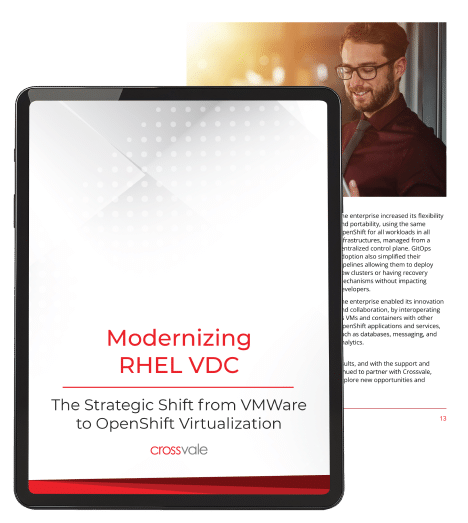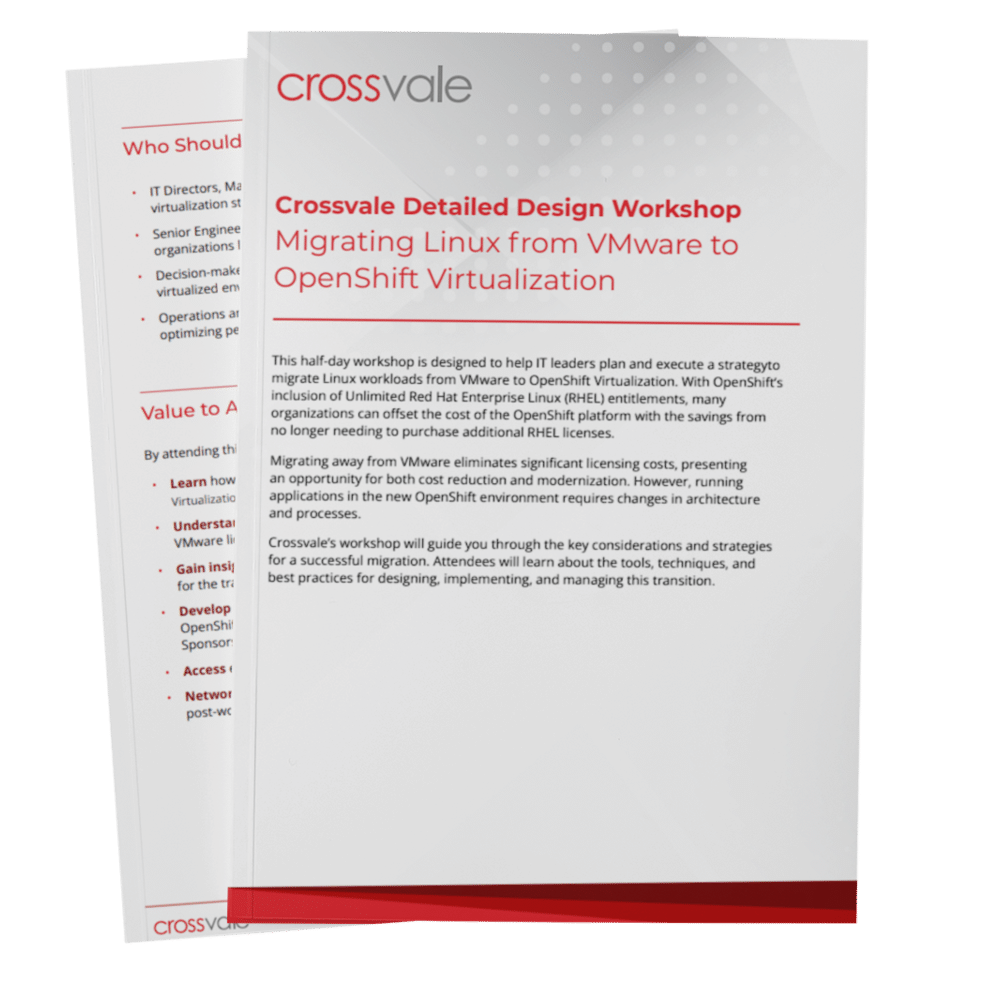The Compelling Case for Migrating from VMware to OpenShift Virtualization
- Reduce in Total Cost of Ownership
- Increase in Deployment Frequency
- Improve in Operational Efficiency
- Streamlined Migration with Minimal Disruption







In today’s rapidly evolving technology landscape, organizations are constantly seeking ways to optimize their operations, reduce costs, and increase efficiency. A key consideration for many is how to migrate VMware systems to more efficient and cost-effective platforms.
The recent acquisition of VMware by Broadcom has prompted many enterprises to reevaluate their virtualization strategies and explore alternatives, like Red Hat OpenShift Virtualization, which can provide both cost savings and improved operational efficiency. If your business is considering a VMware migration, this guide will be invaluable.
This eBook serves as a comprehensive guide for organizations looking to migrate VMware to OpenShift. We’ll cover the challenges and opportunities brought about by the VMware acquisition, as well as the strategic advantages of shifting from VMware to Red Hat OpenShift Virtualization. With a focus on OpenShift virtualization vs VMware, we will dive deep into the benefits of containerization and how it can revolutionize your IT infrastructure.
By examining OpenShift on VMware and comparing Red Hat OpenShift Virtualization vs VMware, you’ll gain insight into why a VMware to OpenShift migration is a forward-thinking choice. Whether you’re interested in understanding the specifics of VMware vs OpenShift or ready to make the leap to containerization, this eBook provides everything you need to know to successfully migrate VMware systems.
Embrace the future of virtualization with Red Hat OpenShift and discover how your organization can transition smoothly from VMware to OpenShift Virtualization.


Crossvale: An award-winning IT solutions provider and trusted member of vendor advisory committees, driving automation and commercial growth.
Containerization Mastery: Clients adopting containerization solutions from Crossvale reported a 50% improvement in application deployment speed and agility, streamlining their operations.
Downtime Reduction: Our clients experienced a 75% decrease in system downtime, resulting in uninterrupted service availability and improved customer satisfaction.
Efficiency Boost: Our solutions reduced manual tasks by up to 70%, resulting in a 45% improvement in overall operational efficiency.
Customer Satisfaction: 94% of our clients reported increased satisfaction and confidence in their IT operations after implementing Crossvale’s solutions.
Don’t just take our word for it! Learn what Gartner is saying about the importance of Platform Engineering
https://www.gartner.com/en/articles/what-is-platform-engineering
Take action now with Crossvale™—your partner in success. Our unique accelerators and unmatched expertise deliver solutions you won’t find anywhere else.
Today’s challenges and opportunities require immediate, strategic decisions. Any delay could lead to missed opportunities and more complicated issues down the line. Choosing the right solution at the right time is crucial, and Crossvale™ is here to guide you every step of the way.
Book a discovery session to explore how Crossvale™ can help you achieve the best possible outcomes.
Migrating from VMware to Red Hat OpenShift offers several advantages, including reduced operational costs, increased scalability through containerization, and enhanced resource utilization. OpenShift’s modern infrastructure is more flexible, making it easier to manage cloud-native applications and containers compared to traditional virtual machines.
OpenShift Virtualization vs VMware brings out key differences. OpenShift focuses on containers and cloud-native applications, providing a more scalable and flexible environment. VMware, while excellent for virtual machines, lacks the advanced container management capabilities of OpenShift, which is designed for hybrid cloud and modern applications.
Red Hat OpenShift vs VMware comes down to your business goals. If you’re looking to modernize your infrastructure and adopt cloud-native solutions, OpenShift offers better container management and integration with modern development tools. VMware is a strong virtual machine platform, but it may not provide the same level of flexibility or cost efficiency in a cloud-native environment.
Some challenges during a VMware to OpenShift migration may include compatibility issues, data transfer complexities, and ensuring minimal disruption to business operations. However, with proper planning and expert guidance, these challenges can be mitigated, resulting in a smooth and successful migration.
The time it takes to migrate VMware to OpenShift depends on the complexity and size of your environment. Talk to Crossvale today to explore your options.
Explore how Crossvale™ can help you achieve the best possible outcomes.

We’re now confidently running COTS and our own applications on OpenShift, enjoying rapid ROI. Crossvale was the answer we’d been searching for
This is co-hosted in partnership with Crossvale and Red Hat. As a result, both Red Hat and Crossvale are collecting your personal data when you submit such information as part of the registration process above. For more information on each party’s privacy practices, please see: Red Hat’s Privacy Statement | Crossvale’s Privacy Policy.